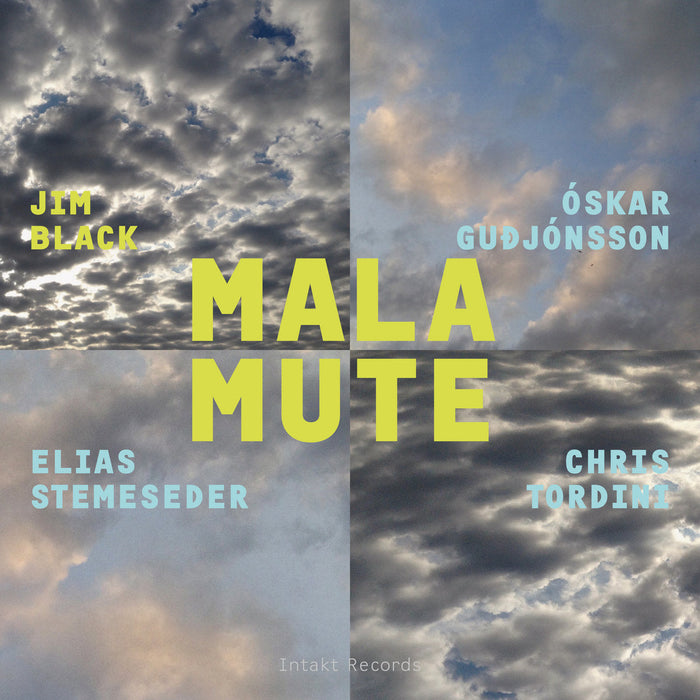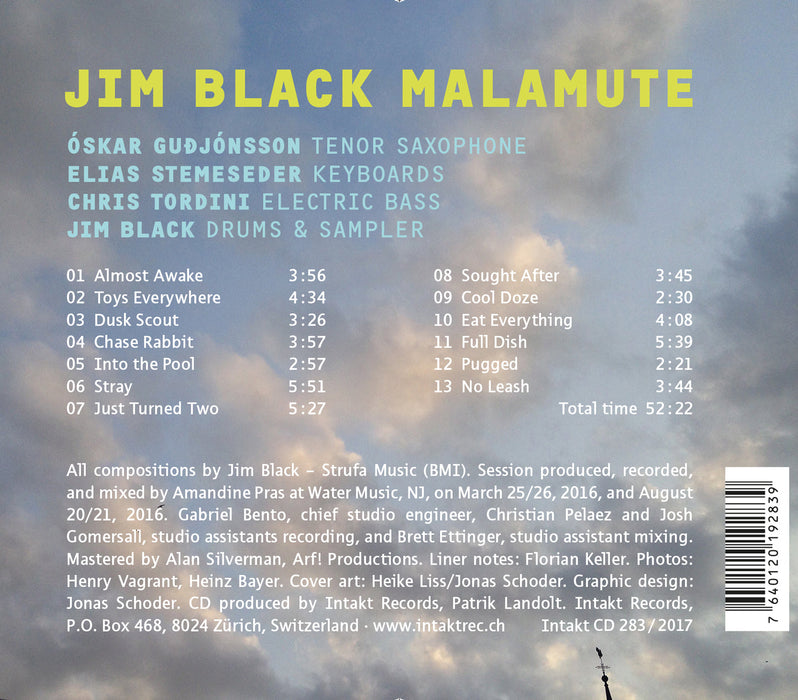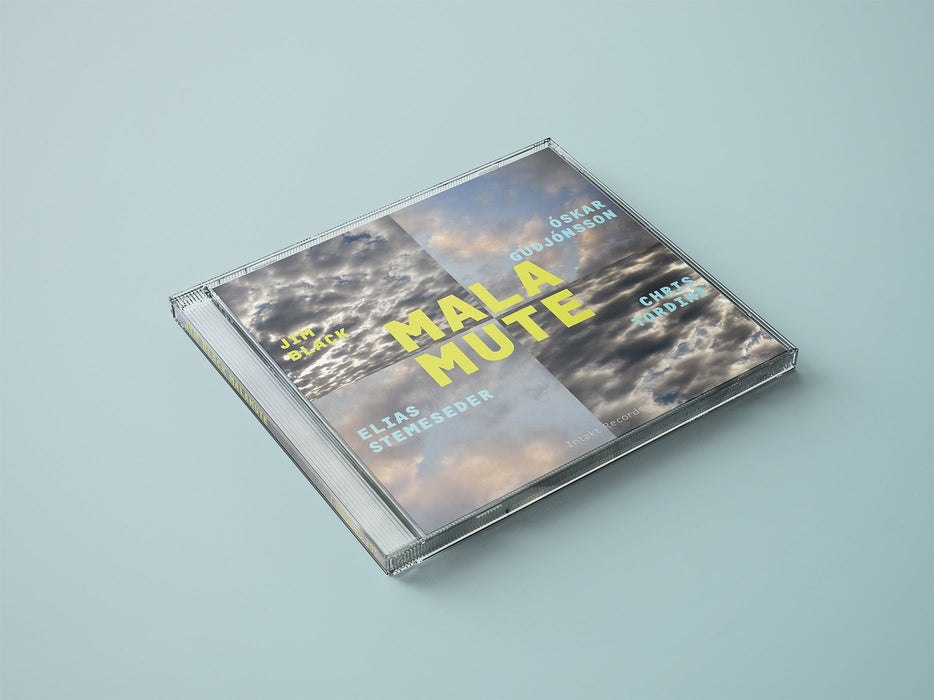


283: JIM BLACK. Malamute
Intakt Recording #283/ 2017
Óskar Guðjónsson: Saxophone
Chris Tordini: E-Bass
Elias Stemeseder: Keyboards, Electronics
Jim Black: Drums, Composition
More Info
Der rastlose Rhythmus-Virtuose Jim Black präsentiert im Anschluss an sein Intakt-Debüt 'The Constant' im Trio sein neues Quartett Malamute mit Óskar Guỗjónsson, Elias Stemeseder und Chris Tordini. Angetrieben von einer kraftvollen Dynamik vereinen die rhythmisch und melodisch vertrackten Songs Melancholie mit expressiver Exaltiertheit. Innerhalb der 13 kurzgehaltenen Stücken vibriert eine Unberechenbarkeit in Form rasch wechselnder Klangtexturen mit, wobei abrupte Umbrüche in eine glückvolle Gleichzeitigkeit des Verschiedenen überführt werden. Jim Blacks Malamute ist ein pulsierender musikalischer Organismus, der sich von der Idee der Simultanität vermeintlicher Gegensätzlichkeiten nährt. Im Minutentakt ändert sich die Musik jeweils komplett und generiert dergestalt einen überraschungsreichen Sog des Unerwarteten.
Album Credits
Cover art: Heike Liss/ Jonas Schoder
Graphic design: Jonas Schoder
Liner notes: Florian Keller
Photos: Henry Vagrant, Heinz Bayer
All compositions by Jim Black – Strufa Music (BMI). Session produced, recorded, and mixed by Amandine Pras at Water Music, NJ on March 25/26, 2016 and August 20/21, 2016. Mastered by Alan Silverman, Arf! Productions.
CD produced by Intakt Records, Patrik Landolt.
There’s a magnetic charm to the way Malamute simultaneously sighs and growls out a melody. The quartet of drummer Jim Black, saxophonist Óskar Guðjónsson, bassist Chris Tordini and keyboardist Elias Stemeseder mesh ambient Icelandic jazz and blunt NYC edge into the same expressions, and the tonal contrast carries equal weight to their fascinating complementary interactions. The ratio of each aspect shifts back and forth within the span of a song, and often quite dramatically. Healthy infusions of electronic effects and samples bolster the organic instrumentation, and how they jostle for position is especially fun. Nothing simple about this music, but the quartet’s delivery sure gives that impression. Connections made easy.
https://www.birdistheworm.com/the-round-up-what-went-unseen/
Sembra che il signor Jim Black non sbagli praticamente mai un solo colpo. Il batterista di Seattle, dai primordi accanto a nomi faro quali quelli di Tim Berne, Ned Rothenberg o Dave Douglas e poi alle personali esperienze seminali di Pachora e AlasNoAxis è cresciuto come poche altre figure che nobilitano il movimento musicale del jazz contemporaneo.
Malamute è l'ultima proiezione del nostro, ponderata dopo una lunga stagione di concerti e entrata dunque in studio ben carburata e con le idee molto chiare sul "cosa fare." La scelta di Black, qui accanto all'ormai fido e straordinario pianista austriaco Elias Stemeseder, il sassofonista islandese Oskar Gudjonsson (ben conosciuto per le belle scorribande sonore con Skuli Sverrisson) e il "rising artist" Chris Tordini al basso elettrico, già accanto a Greg Osby, Andrew D'Angelo, Erik Friedlander e Chris Speed, è in linea con la sua consueta intelligenza musicale. Linee strutturali decisamente atipiche, spesso lente e cadenzate, unite grazie ad un'attenta chimica e donate all'ascoltatore in uno splendido distillato di ricombinazioni sonore di rara bellezza. Basata su un'idea di "modern mix," l'architettura che governa il progetto è capace di offrire piani prospettici che sembrano mutare di minuto in minuto, arricchendo il tutto con profondità e spessore.
Di chiaro intento espressivo, le tredici composizioni di questo nuovo lavoro discografico mostrano innanzitutto la completezza stilistica e formale raggiunta da Black nei territori della scena "progressive" attuale. Malamute è una sorta di unico patchwork sonoro, di sperimentali groove rock e di splendide proiezioni di sviluppo tematico. Il leader è poi sempre più a suo agio nell'elaborazione elettronica, riuscendo a riempire con l'aiuto del sempre più essenziale Stemeseder, i contrasti ritmici di progressioni musicali molto personali, utilizzando una vasta gamma di scelte tonali fuori dai canoni, di chiara brillantezza e bellezza.
In breve, un lavoro di trascendentale creatività e di notevole ricchezza dimensionale. Impossibile non restarne colpiti, esattamente con lo stesso moto di stupore causato dall'estrema peculiarità della razza di cani esquimesi dell'Alaska, dalla quale il progetto prende nome e ben conosciuta per la rara capacità di condividere la propria esistenza con il gruppo con il quale condivide anche temporaneamente la strada. In breve quasi un sinonimo di capacità di "vivere un gruppo." Cosa che, per nostra fortuna, Black fa sistematicamente da sempre come pochi altri musicisti moderni.
https://www.allaboutjazz.com/malamute-jim-black-oskar-gudjonsson-elias-stemeseder-chris-tordini-intakt-records-review-by-vic-albani
Malamute, the new album from drummer Jim Black named for a large breed of Alaskan dog, is a listening experience akin to approaching a large, tied-up canine you're not certain is friendly or ferocious. Most of the players in this group-keyboard player Elias Stemeseder, electric bassist Chris Tordini and especially the leader-have been involved with some of NYC's most exploratory musical situations while Icelandic tenor saxophonist Óskar Guðjónsson is more of a songster, with a Nordic style midway between melody and melancholy.
Not one of the CD's 13 tracks is longer than six minutes, with most in the three-minute range. Although crossbreeding can produce as attractive a dog as a labradoodle and artists as disparate as Duke Ellington and The Ramones have dealt memorably with miniature forms, this particular litter of tunes suffers from the lack of energy you would expect from an older pooch rather than a puppy. Since nearly all the tunes have titles related to canine life, from "Chase Rabbit" and "Stray" to "Pugged" and "No Leash", it's tempting to treat Malamute as the result of obedience training overboard.
The first tracks meander among sampler echoes, downbeat drumming and slurred sax tones until "Into the Pool's sudden keyboard splashes, drum ratamacues and staccato tongue stretches, propelled with the enthusiasm of a dog shaking himself after a long nap. Later tracks such as "Just Turned Two" and "Full Dish" are even better: the fomer attains a rock- like groove via Black's backbeat, Morse-code-like pumps from Stemeseder and wide vibrations from Guðjónsson while the latter puts vitamins in the kibble since the cool contrast of the saxophonist's straight- line theme-elaboration with the drummer's jagged pumps sets up a contrapuntal challenge that imbues this track with more emotional heft.
It's this overall lack of passion which makes Malamute a poor candidate for adoption. Perhaps next time out, the old dogs here will learn new (and livelier) tricks. The pedigree is certainly obvious.
Mala Mute ou le retour à peine voilé de l'Alasnoaxis de Jim Black. Pas de copier-coller ici mais de prégnants points communs solos nonchalants-détachés avec distanciation harmonique appuyée du
saxophoniste (Oskar Gudjonsson), jeu coupant et serpentin du leader avec essorage de la forme, compositions à tiroirs, axes répétitifs et dérobades binaires. On retrouve ici l'étrange subtilité du
batteur, cet art de frapper fort tout en réduisant le volume (cymbales découpées, toms feutrés) et, surtout, cette manière, assez inouïe, de recomposer la mesure, de naviguer à l'intérieur en toute
liberté, générant ainsi une sensation de diversité vertigineuse.
La nouveauté se situe du côté des claviers bourdonnants d'Elias Stemeseder et des samplers du leader. Ajoutons-y quelques vertus bruitistes bien senties (elles perçaient déjà avec Alasnoaxis) et vous aurez une juste idée d'un disque dont le propulseur en chef, Mister Jim Black, peut être fier. Voire très très fier.
Jim Black emerged in New York's downtown scene of the 1990s, playing alongside Dave Douglas and Tim Berne. He went on to establish himself as a bandleader, with AlasNoAxis, as well as to work with the likes of Dave Liebman, Steve Coleman and Nels Cline. His frame of reference, however, has always been broad: he has also worked with Laurie Anderson, for instance, and his playing draws on everything from Balkan music to drum'n'bass. Malamute comprises material that emerged during a 2015 European tour, inspired by mixtapes and playlists. The album is intended as a kind of ADHD approach to composition and improvisation, and it is, indeed, diverse, moving from abstract ambience to pleasingly wonky grooves; the pieces are relatively short, the sonics now subtle, now abrasive. As with the best mixtapes, though, there is a thread tying together the elements of electronica, jazz and alt rock, even if the pieces sometimes feel underdeveloped. It's just a shame that, in 2017, we don't get handwritten track names.
Like approaching a large tied up canine you’re not certain is friendly or ferocious, Malamute can lead to the same ambivalence. Most of the players in this brand new group – keyboardist Elias Stemeseder, electric bassist Chris Tordini and especially drummer Jim Black – have been involved with some of downtown NYC’s most exploratory musical situations, while Icelandic tenor saxophonist Óskar Guðjónsson is more of a songster, with a Nordic style that’s midway between melody and melancholy. Plus not one of the CD’s 13 tracks is longer than six minutes, with most in the three minute range.
Although cross breeding can produce as attractive a dog as a labradoodle and artists from Duke Ellington to The Ramones have dealt memorably with miniature forms, this particular tune-litter appears to suffer from the lack of energy you would expect from an older pooch rather than a puppy. Since nearly all the tune titles are dog-related it’s tempting to treat Malamute as the result of obedience training gone wrong. While the disc livens up at mid point, additional coaching seems necessary to turn the quartet into a furry helpmate and a person’s best-friend.
Admittedly designed for contemporary short attention spans, the first tracks meander among sampler echoes, downbeat drumming and slurred sax tones until “Into the Pool”. Sudden keyboard splashes, plus ratamacues and staccato tongue stretches propelled with the enthusiasm of a dog shaking himself, suggest Malamute has awakened from canine shut-eye. Later tracks such as “Just Turned Two” and “Full Dish” are even better. The first attains a rock-like groove via Black’s backbeat, Morse-code-like pumps from Stemeseder and wide vibrations from Guðjónsson. Meanwhile “Full Dish” must have put vitamins in the kibble since the cool contrast of the saxophonist’s straight-line theme-elaboration with the drummer’s jagged pumps sets up a contrapuntal challenge that imbues this track with more emotion than expressed elsewhere.
Overall it’s this lack of passion which makes Malamute a poor candidate for adoption. Puppy-like hyperactivity is avoided here, but it’s replaced by the feeling that too many of the tracks are as inert as lapdogs. Perhaps next time out, the old dogs represented here will learn new (and livelier) tricks. The pedigree is certainly obvious.
https://www.jazzword.com/reviews/oskar-gudjonsson-elias-stemeseder-christopher-tordini-jim-black/
Mit E-Bass ist es Jazzrock? Chris Tordini spielte bei Michael Dessen, Tyshawn Sorey oder in Nescier & Webers NYC Five bisher Kontrabass. Bei JIM BLACK MALAMUTE (Intakt CD 283) verlockt sein E-Sound beim anfänglichen 'Almost Awake' neben den Keys von Elias Stemeseder zu Sprüchen wie "In a Silent Way" meets Jan Garabarek, mit Óskar Guðjónsson am Tenorsax als Garbarek. Black selbst unterstreicht mit Sampler noch den modalen Horizont, der Schlittenhund im Namen vertieft den nordisch verschneiten Pelzpfotentouch. Aber dann ist doch vieles anders. Weil die vier nicht nur 13 Stücke spielen, sondern mit unvermutetem Shapeshifting diese 3-, 4- 5-Minüter in ihrem Flow, ihrer sanft konturierten Drift, brechen und raue Kanten und dunkle Unterseiten hervorkehren. So dass man sich im Insichwiderspruch aus dem Saxophon, das tatsächlich voller 'nordischer' Melancholie und der Sehnsucht nach Wärme summt, und einer immer wieder eisig klirrenden oder rau knurschenden und aufbrausenden E-Bass-Keys-Front blaue Flecken und Frostbeulen holt. Black forciert mit eisigen Nadeln aus dem Sampler, aber auch mit knackig treibendem Beat und klackenden, pochenden, Blech dreschenden Schlägen eine klondike-fiebrige Jack London-Poesie, die Guðjónsson mit isländischem Engelsschmerz durchwirkt. Wie man nur mit Melancholie und Monotonie doch so viel sagen kann. Da kann jemand in Weiß- und in Ofenglut schwelgen, dass einem ganz warm wird, aber bei 'Stray' auch ganz verloren stöhnen. Auch Stemeseder, mir bisher, auch im Jim Black Trio, nur als Edelfinger am Piano geläufig, zeigt am Wurlitzer (etc.?), zu dem er wohl auch schon in Eyebone (mit Black & Nels Cline) wechselte, ein wetter- und sogar unwetterfestes Hundeherz, die Verve eines knurrigen Rockers, der das atmosphärische Fürsich in Zwielicht taucht, mit dunklen Schüben beorgelt und in heftige Wallung versetzt.
Grenzenlos und unvorhersehbar
Jim Black Malamute - frisch
Der 1967 geborene Schlagzeuger Jim Black kam von Seattle übers Berklee College nach New York und ist auch hierzulande gerne unterwegs. Blacks individuelles Spiel geht weit über Grooves hinaus, seine Intensität und Präsenz beflügelte Prominenz wie Uri Caine oder Tim Berne. Mit dem erst 26 Jahre alten, aus Salzburg über
Berlin in New York gelandeten Pianisten und Keyboarder Elias Steme- seder spielt Black schon seit 2008, beide eint ein Faible für Rhythmen, elektronische Sounds und Samples. Komplettiert wird Malamute durch E-Bassist/Gitarrist Chris Tordini und Saxophonist Óskar Guðjónsson (sie- he ADHD). Ihr Debütalbum soll dieser Tage erscheinen.
Jim Black ist ohne Zweifel einer der besten und einflussreichsten Drummer der letzten Jazzjahrzehnte. Seine Arbeit ist auf zahlreichen Tonträgern dokumentiert, und fast keiner der Granden der avancierteren Klänge ist an seinem virtuosen, flexiblen Schlagzeugspiel vorbeigekommen. Immer wieder stellt Black auch eigene Projekte vor, die aber nur bedingt überzeugten. So ist auch seine neue CD, immerhin beim Schweizer Vorzeigelabel Intakt erschienen, eher durchwachsen. Im Quartett mit dem Tenorsaxofonisten Oskar Gudjonsson, dem Keyboarder Elias Stemeseder und dem Strombassisten Chris Tordini performt Black ausschließlich Eigenes. Seine Stücke sind knappe Nummern, zwischen zwei und fünf Minuten lang, Miniaturen, die Flexibilität und Variationsfähigkeit dokumentieren sollen. "Ich muss immer in Bewegung sein", meint Black im Booklet des Tonträgers. Kaum hat man sich auf eine Komposition eingelassen, ist sie schon vorüber. Vor allem die Soli von Gudjonsson wirken irgendwie unfertig. Stemeseder produziert viele sphärische Flächen, die manches überdecken und zudem ziemlich retro klingen. Beim zweiten oder dritten Mal Horchen entpuppen sich auch Stärken der Platte. Spannende Momente zwischen Saxofon und Schlagwerk, ein virtuoser Bass. Die Grundtendenz der Kritik behält aber ihre Gültigkeit.
Nouveauté. Après un album en trio acoustique salué par un Choc dans ces pages ("The Constant", également chez Intakt), le batteur Jim Black nous revient avec un nouveau projet résolument électrique, qu'on ne saurait réduire à un simple remake de son groupe "culte" AlasNoAxis. Riche en contrastes, la musique de Malamute broie à travers une même moulinette déstructurante les influences jazz, rock et électro, au fil de treize plages assez brèves à la dramaturgie finement étudiée. Si le ténor très lyrique du saxophoniste islandais Oskar Guðjónsson représente en quelque sorte l'élément "humanoid" dans cet univers synthético-futuriste, sa sonorité étouffée et mate, renonçant presque entièrement au spectre aigu, contribue à instaurer comme une étrange sensation de flottement, renforcée par les sonorités électroniques floues et impressionnistes distillées par le clavériste autrichien Elias Stemeseder. Seuls le drumming sec et précis du leader et la basse électrique tranchante de Chris Tordini (surtout connu comme contrebassiste) apportent un semblant de netteté à cet univers sonore chaotique et instable, qui pourra aussi bien vous donner le mal de mer que vous entraîner dans une ivresse délicieusement
insécurisante.










